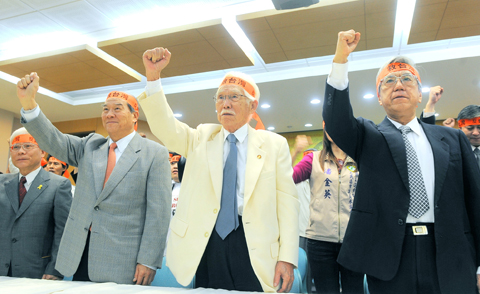More groups are preparing to rally against an economic cooperation framework agreement (ECFA), vowing to hold a month-long nationwide protest against the proposal, the organizations said yesterday.
Former presidential advisor Koo Kwang-ming (辜寬敏) and representatives of the groups, which include university professor and non-profit organizations, raised concerns yesterday that an ECFA would negatively impact Taiwan’s job market and fragile industries.
A number of Democratic Progressive Party (DPP) lawmakers offered support, joining in cries of “declare war” until President Ma Ying-jeou (馬英九) reconsiders his plan to sign the pact.

PHOTO: WANG MIN-WEI, TAIPEI TIMES
Taiwan Rescue Action Alliance chief Lin Yi-cheng (林宜正), one of the Taipei event’s organizers, told a press conference yesterday that the Ma government should hold a referendum before signing an ECFA with China in June.
“If there is no ECFA referendum, the people are bound to end up on the streets,” he said.
The protest is expected to attract the backing of a number of labor organizations, the organizers said, adding that the campaign would involve protests, conferences and lectures.
A statement later released by the groups called the timing of the campaign “a historic juncture,” and added that the referendum was necessary because of concerns over China’s political ambitions toward Taiwan.
“We want to show the world that Taiwanese stand together in our opposition to the ECFA and our protection for Taiwan,” the statement read.
Koo said that despite Sunday’s ECFA debate between Ma and DPP Chairperson Tsai Ing-wen (蔡英文), the government has not eased concerns that the agreement could unfairly benefit large corporations.
Campaign organizers said a lecture on the ECFA would take place tomorrow night at Taichung City’s Guang Fu Elementary School. Another conference on the ECFA will take place on Sunday in Kaohsiung City and lectures have also been scheduled for May 7 and May 8 in Taichung County.

The first global hotel Keys Selection by the Michelin Guide includes four hotels in Taiwan, Michelin announced yesterday. All four received the “Michelin One Key,” indicating guests are to experience a “very special stay” at any of the locations as the establishments are “a true gem with personality. Service always goes the extra mile, and the hotel provides much more than others in its price range.” Of the four hotels, three are located in Taipei and one in Taichung. In Taipei, the One Key accolades were awarded to the Capella Taipei, Kimpton Da An Taipei and Mandarin Oriental Taipei. Capella Taipei was described by

EVA Airways today confirmed the death of a flight attendant on Saturday upon their return to Taiwan and said an internal investigation has been launched, as criticism mounted over a social media post accusing the airline of failing to offer sufficient employee protections. According to the post, the flight attendant complained of feeling sick on board a flight, but was unable to take sick leave or access medical care. The crew member allegedly did not receive assistance from the chief purser, who failed to heed their requests for medical attention or call an ambulance once the flight landed, the post said. As sick

The Taichung District Court yesterday confirmed its final ruling that the marriage between teenage heir Lai (賴) and a man surnamed Hsia (夏) was legally invalid, preventing Hsia from inheriting Lai’s NT$500 million (US$16.37 million) estate. The court confirmed that Hsia chose not to appeal the civil judgement after the court handed down its ruling in June, making the decision final. In the June ruling, the court said that Lai, 18, and Hsia, 26, showed “no mutual admiration before the marriage” and that their interactions were “distant and unfamiliar.” The judge concluded that the couple lacked the “true intention of

INDUSTRY: Beijing’s latest export measures go beyond targeting the US and would likely affect any country that uses Chinese rare earths or related tech, an academic said Taiwanese industries could face significant disruption from China’s newly tightened export controls on rare earth elements, as much of Taiwan’s supply indirectly depends on Chinese materials processed in Japan, a local expert said yesterday. Kristy Hsu (徐遵慈), director of the Taiwan ASEAN Studies Center at the Chung-Hua Institution for Economic Research, said that China’s latest export measures go far beyond targeting the US and would likely affect any country that uses Chinese rare earths or related technologies. With Japan and Southeast Asian countries among those expected to be hit, Taiwan could feel the impact through its reliance on Japanese-made semi-finished products and